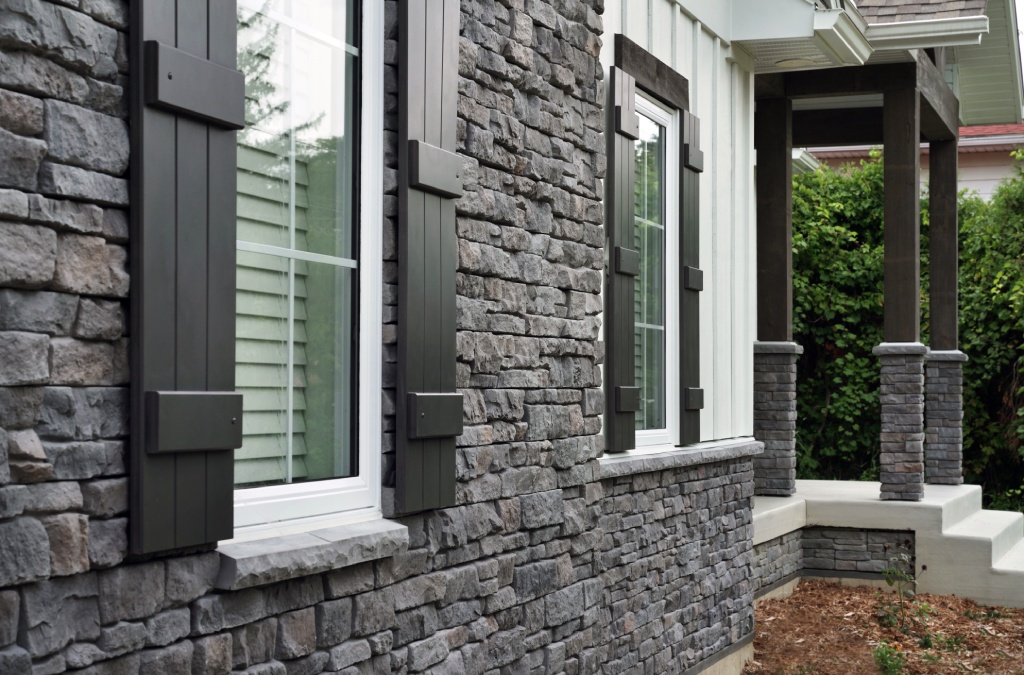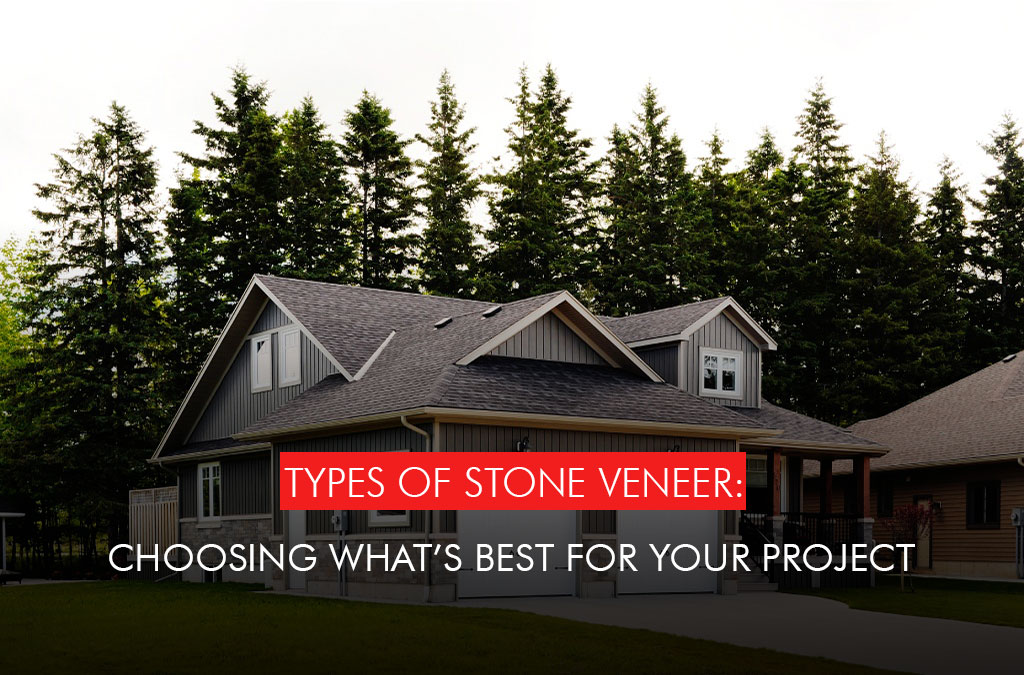Types of stone veneer: Choosing what’s best for your project
June 15, 2022
There are countless options when it comes to finishing an exterior or interior space.
A stone look is popular because it adds an authentic and natural feel to any wall. Stone veneer is often the perfect, no-brainer choice for a client who’s fallen in love with the appearance of stone or wants to embrace a natural look for their home.
Main varieties of stone veneer: Manufactured, 100 % natural or synthetic
Manufactured stone veneer is a decorative product made from molded cement mixed with natural aggregates and iron oxides, which allows it to accurately mimic the look and feel of natural stone while being much lighter and more cost effective. This makes it versatile enough to apply to a variety of places like outdoor kitchen islands, exterior columns or fireplaces surrounds. Some brands are full-bed depth and some are a quite thin; some require mortar, and some don’t.
One hundred per cent natural stone is more often used in structural stonework, which stone veneer is not designed to do. Quarried stone can be sliced into thin veneers and used decoratively, but often these slices lack the conveniences of the manufactured type.
Synthetic polymer choices should usually be avoided, as they often feel simply like plastic foam and don’t easily replace harder products made from natural aggregates.

Which stone veneer is popular?
The manufactured type of stone veneer is the go-to choice of faux stone for many contractors because it allows you to have a high quality product that gives the look and feel of quarried natural stone at a more accessible price point.
It’s very durable and suitable for interior, exterior, residential and commercial applications.
There is a wide availability of styles, textures and shapes to choose from, which offer stunning curb appeal for any home.
Unlike natural quarried stone, a typical stone veneer made from natural aggregates often has raked backs for easy application, and it’s sold at local retailers in packs ready for use – accelerating your efficiency at the jobsite.
This type of stone veneer is a great product, just remember to factor into your time and cost estimates that many manufactured stone veneer products need mortar, and some brands look and function best when a qualified mason to applies them.
Always do your research since the quality and application specifications for these veneers can vary according to brand.
Best uses for stone veneer that needs mortar:
New builds or extensive projects with medium to high budgets where you want to use the extra expert consultation and skill of a mason.
Mortarless manufactured stone veneer
Many stone veneer types require mortar, but not all of them. And a no-mortar system offers the benefits and conveniences of typical stone veneer without the mess or cost in time and dollars.
Fusion Stone is a patented mechanically fastened system that is screwed into plywood or OSB substrate on just about any wall. Without mortar, you don’t have to wait for anything to dry or be concerned about the effects of weather or temperature; nor do you have to hire an expensive, specialized team member like a mason.
Pre-assembled packs that contain the stainless-steel screws you’ll need keep the jobsite clean and efficient.
Best uses of mechanically fastened veneer:
Feature walls and projects; finished spaces that benefit from a no-mess application; interior and exterior walls and wainscots.
What type of stone veneer to use, and when?
Larger vs smaller scale projects
Budget is always top of mind for any project, and any efficiencies are valuable. At the same time, a larger scale project like a new build may give you the leeway to hire a mason for a really polished, professional look, and so you can take on other crucial projects involved in the job.
For a smaller project, you can be even quicker and more cost efficient by using a mechanically- fastened system. You can apply the stone yourself and cross training any team member to install it if needed.
Interior vs exterior projects
Always check the brand’s recommendations, but many types of stone veneer are appropriate for installation indoors or outdoors.
You might think you shouldn’t use mechanically-fastened stone veneer on exterior walls out of fear of allowing moisture to get trapped behind the fastening system, but Fusion Stone is actually engineered with a rainscreen to block out wetness, and a code-approved vapour barrier behind the system helps prevent water issues too.
Properly installed, Fusion Stone product is guaranteed for life, so go ahead and apply it outdoors. It can withstand varied temperatures and degrees of wetness which can all affect the success of a stone veneer applied with mortar.
For use inside or out, look for a stone that will stand up to wear and tear too – Fusion Stone has colour throughout the stone, so any unlikely chips or scratches won’t catch the eye.
Quick tips for tough style choices
Client tired or nervous about decision-making?
Fusion Stone’s Great Lakes profile is a good bet. Ideal for a traditional or rustic feeling, this versatile, classic option comes in four unique colourways and offers a rich, comforting appearance for wide appeal.
Very small space or a highly modern vision?
The design of our Dry-Stack look highlights the lack of mortar, offering uniform elegance to help create a sleek accent piece or a full, completed project. Its smaller scale makes it a good bet in tight spaces.
To find out more about these mechanically-fastened stone veneer options, please visit our Frequently Asked Questions or connect with our friendly team.



